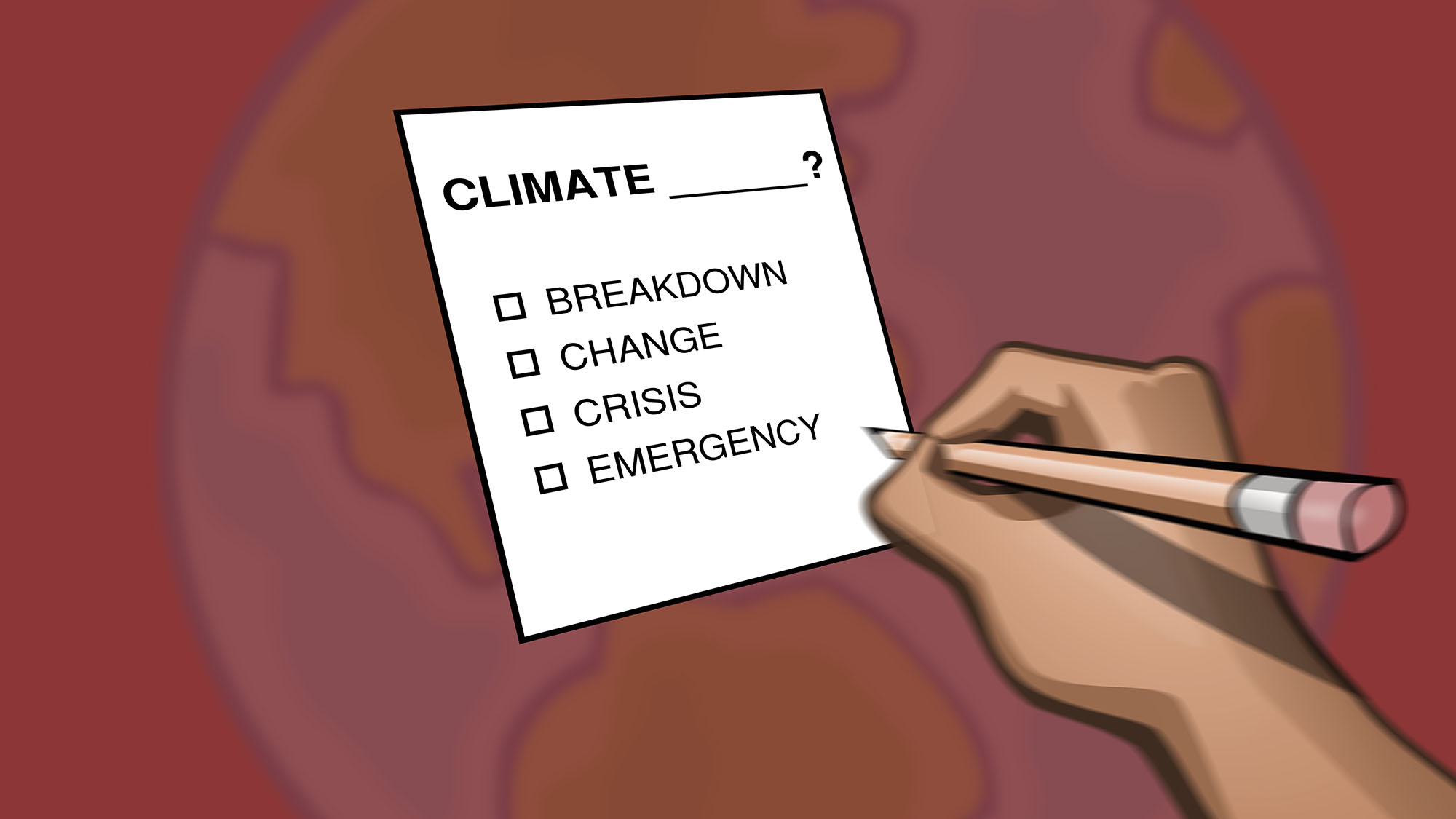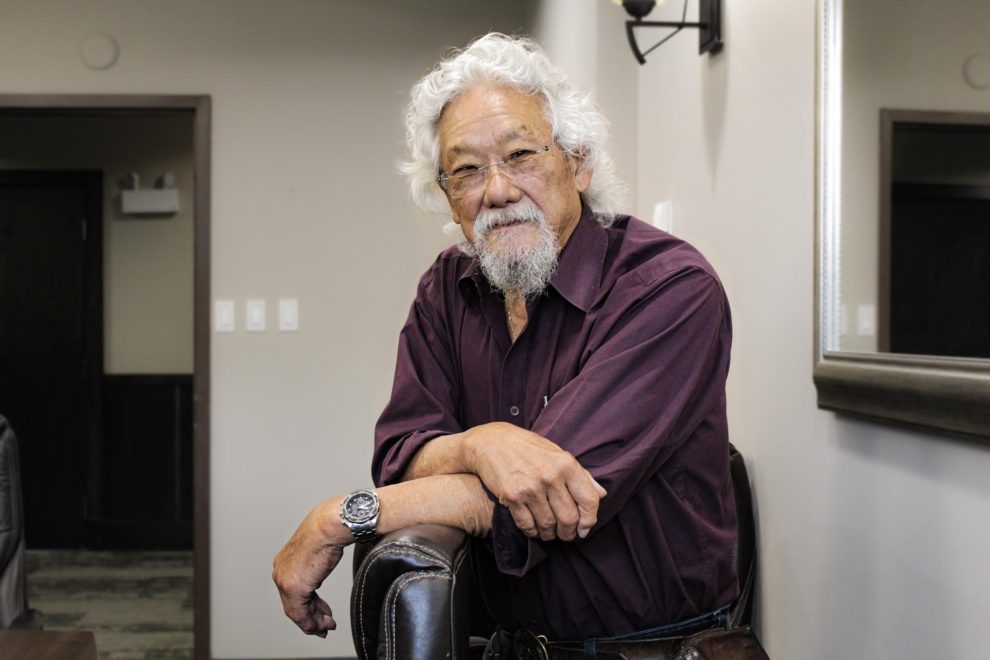Newsrooms, the heat is on

caption
Scientists and governments have declared a climate emergency. Journalists debate.
In 1988, former broadcaster David Suzuki spent two months in the Amazon, where fires were raging. On the last day he was supposed to fly out but couldn’t, because of the smoke. “I called my wife,” he says. “She claims I was weeping.”
Suzuki was working on a CBC-TV show, The Nature of Things. Moving towards environmentalism from there, he says, was a “natural evolution.” As a scientist, even 30 years ago, he often spoke about the impact humans had on the environment.
During that time, he was also working for the Globe and Mail as a science columnist. In 1989, the Globe let him go. “They said I was… talking too much about the environment. I said ‘the environment is everything.’”
The science is clear, undeniable and threatening: climate change is the most dire problem facing our world. Up to a million species of animals and plants face extinction. Journalists concerned about telling the truth – and expressing it clearly – should care about what language they use when covering the climate.
In May 2019, the Guardian announced a change in its style guide to encourage its journalists to use the terms “climate crisis,” “climate emergency,” “climate breakdown,” and “global heating” instead of “climate change” or “global warming.” The paper also suggested “climate science denier” rather than “climate sceptic.” The Guardian’s editor-in-chief Katherine Viner told readers, “the phrase ‘climate change,’ for example, sounds rather passive and gentle when what scientists are talking about is a catastrophe for humanity.”
The Guardian’s announcement sparked a debate among Canadian journalists.
Sean Holman, a journalism professor at Mount Royal University in Calgary, published an open letter to Canadian media 10 days later. The letter shows examples of what Holman called “mainstream Canadian news media’s repeated failure to apply basic journalism principles to the climate change crisis confronting us.”
Holman was basing this partly on his study of media coverage of the 2018 B.C. wildfires. Of 182 online articles about those fires, only 14, or 7.7 per cent, mentioned the connection between the fires and climate change. Canadian media, he says, has not been reporting on climate with appropriate urgency. Climate science, he says, has “reached the certainty required for comprehensive and aggressive news coverage.”
Newsroom style guides
The Canadian Press Stylebook’s latest edition (2018) does not mention covering climate. James McCarten, the Stylebook editor, says the next edition will consider climate language.
Changes in language, McCarten says, need to happen organically; climate change is a term that has only become popular in the last few years. He also says that CP reporters can use more drastic language if they feel it’s appropriate. “If we need to communicate the urgent nature of the issue we can simply say ‘climate change emergency’ or ‘climate change crisis.’”
(The 2019 American Press Stylebook says that “global warming” and “climate change” are interchangeable words. It also does not mention the term “climate crisis.”)
The CBC updated its internal style guide in June, following the Guardian’s decision. It now states that alarming words such as “crisis” and “emergency” are allowed, but not always preferred.
A CBC article in June quoted Paul Hambleton, CBC’s Director of Journalistic Standards, saying, “‘climate crisis’ and ‘climate emergency’ are words that have a whiff of advocacy to them… They sort of imply, you know, something more serious, where climate change and global warming are more neutral terms.”
Sean Holman says he found this statement “ridiculous. We’re talking about a phenomenon that by 2050 could result in 250,000 deaths in that year alone, a million species could go extinct, a billion people to be displaced from their homes. That sounds like a crisis to me.”
Suzuki had a more direct response to Hambleton: “I would love to kick his ass.” As a public broadcaster, he says, the CBC is “a special place, but everyone is so chickenshit about getting beat up on.”
Asked to respond to this criticism, Hambleton said, “I’ve got a lot of respect for David Suzuki and he’s been a pioneer in this area. I don’t know him personally (but) I certainly respect his work. The positions that we have at CBC just reflect our journalistic standards and protocols that we have.”
Sean Holman believes we live in a time when, to those who don’t like the truth, telling the truth appears biased. Using crisis language, he says, is “not advocacy. It’s accurate.”

caption
David Suzuki.Language matters
Roberta Laurie, an applied communications professor at MacEwan University in Edmonton, says that people do not understand the origins of the term “climate change.”
Popularization of the term followed a 2003 language advisory to the U.S. administration of George W. Bush. Frank Luntz, a leading Republican consultant at the time, recommended that the government adopt the term “climate change” in favour of “global warming” and other specific terms, in order to assure the public that there was no immediate risk.
Laurie points out that this is similar to Alberta’s popularization of the term “oil sands” in place of “tar sands,” to make it seem cleaner. What needs to happen with climate language, she says, is a shift from a term designed to deceive to one that accurately represents the situation. “I don’t think that it’s accurate to call that alarmist.”
David Phillips, the senior climatologist at Environment Canada, has been thinking about climate language for more than 50 years. He says that “climate change” fits in the sense that we are still going through it; we haven’t reached the tipping point yet. But, he says, the ongoing change is also fundamental. “It’s irreversible – that makes it a crisis.”
We have known about man-made climate change for almost 200 years. Today, we have what was long missing: proof.
The rise in global temperature since the 1980s is currently measured at 1.0 degrees Celsius. In a 2018 October special report, the International Panel on Climate Change (IPCC) stated that the Earth is heating up faster than ever and that limiting this increase to 1.5C is, quite literally, a matter of life and death. Doing so would require a 45 per cent reduction in carbon emissions by 2030.
Shane Gunster, a communications professor at Simon Fraser University in B.C. and co-author of the 2017 book Journalism and Climate Crisis, believes that transparently echoing science language is not effective journalism. When covering climate, he says, journalists must find a way to accurately, and effectively, communicate not just language but scientific understanding.
“To a lot of climate scientists,” says Gunster, “‘climate change’ implies climate chaos.” The words “global heating,” he says, are much more effective in communicating the nature of the science than “global warming”: they are less fuzzy.
Canadian media, Gunster believes, are now catching on to these fresh definitions.
A political climate
After four years of American environmentalism under Jimmy Carter, Ronald Reagan’s conservative U.S. presidency, starting in 1981, politicized and neglected climate change. “If we called it atmospheric terrorism,” climatologist Phillips said jokingly, “we’d have this thing nailed to the ground.”
Public Citizen, a Washington, D.C. non-profit advocating for consumer rights, in June 2019 wrote an open letter to U.S. news media, calling for accurate reporting of the climate crisis. Its 2018 report revealed that of 1,429 TV news stories that mentioned climate change only 50, or 3.5 per cent, referred to it as a crisis or emergency. From January to April 2019, 145 TV news stories reported on climate as a crisis – triple the amount in all of 2018 (but most of them were referring to a hypothetical designation of a “climate emergency”).
The report also stated: “In 2018, Fox News mentioned the words ‘crisis’ or ‘emergency’ in relation to climate change on five occasions. All five were attempts to minimize the issue with false reasoning, mockery, and misinformation.”
Margaret Sullivan, a media columnist at the Washington Post, says journalists have an obligation to report on how serious the climate situation is. Calling climate a crisis, she says, does not veer into a form of advocacy that should be criticized. “Advocacy means ‘speaking for.’ If journalists can speak for the public,” she says, “then that’s just fine by me.”
David Suzuki believes that what the news media chooses to cover reveals its bias – loudly and clearly. “Who owns the media?,” he says. “The bias is absolutely extreme.” For example, he believes that the National Post covers climate inadequately. “They’re an advocacy newspaper; they call themselves a national newspaper.”
News media overall, he says, has been reticent about covering climate change with urgency and accuracy. But reporting this issue factually is the responsibility of journalists. “We are long overdue,” he says. “We should have been sounding the alarm a long time ago.”
About the author
Karla Renic
Karla Renic is a multimedia journalist in her fourth year at the University of King's College. She freelances and works as the news editor at...
